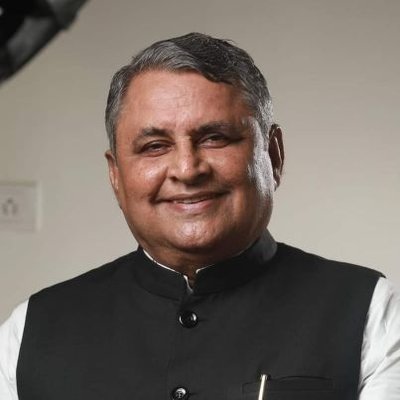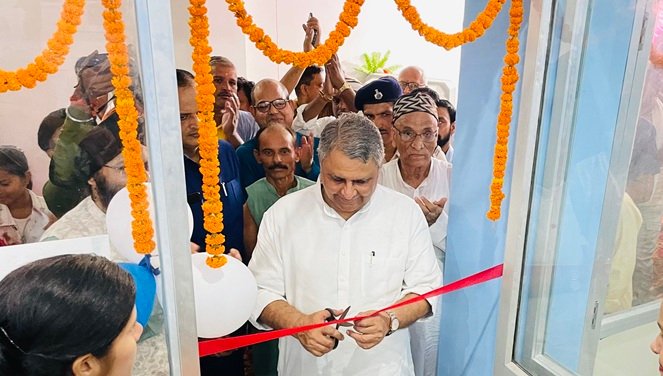Anhad India expands to Bihar with its first paramedic-assisted digital health center in Bajitpur, inaugurated by Minister Vijay Kumar Choudhary, aiming to reduce out-of-pocket costs and improve access for rural communities.
PATNA (India CSR): In a significant boost to Bihar’s rural healthcare landscape, Anhad India, a trailblazing initiative under the Karma Healthcare Trust, has officially forayed into the state with the launch of its flagship paramedic-assisted digital health centers. The inaugural center in Bajitpur village was unveiled by Vijay Kumar Choudhary, Minister for Water Resources & Parliamentary Affairs, Government of Bihar. This expansion, backed by the SwissRe Foundation, marks a pivotal step toward making high-quality, affordable healthcare accessible to underserved populations, addressing long-standing systemic challenges in the region.
Anhad India’s model integrates cutting-edge technology with grassroots care, operating nearly 60 telemedicine centers across 11 states and Union Territories. These centers provide a one-stop solution for essential services, including doctor consultations, diagnostics, medicines, and follow-ups. To date, the organization has treated nearly 2 lakh patients, saving communities substantial costs and travel burdens.
Partners like Hyundai Motor India Foundation, Swiss Re Foundation, Ray of Hope International Foundation, Ujjivan Small Finance Bank, and Innovators in Health (IIH) have been instrumental in scaling this impact.

Addressing Bihar’s Healthcare Challenges
Bihar, despite progress in health indicators, grapples with inadequate infrastructure. The doctor-to-population ratio stands at a dismal 1:2148, far below the WHO’s recommended 1:1000. Alarmingly, 44% of Primary Health Centers (PHCs) and Additional PHCs operate without 24/7 services, forcing residents to endure long journeys and high out-of-pocket expenses—accounting for 77.6% of total health spending. Rural families, especially women and children, bear the brunt of these gaps, often delaying critical care due to financial and logistical barriers.
Anhad India’s entry aligns seamlessly with Bihar’s Comprehensive Primary Healthcare (CPHC) priorities. The Bajitpur center offers general and specialist consultations via telemedicine, screenings for non-communicable diseases like diabetes and hypertension, eye care, and preventive health programs. By emphasizing community engagement and health promotion, the initiative not only treats illnesses but also empowers locals with knowledge to prevent them.
Telemedicine connects patients directly to a network of specialist doctors across India, eliminating the need for urban travel and reducing costs significantly.
Bihar Health Infrastructure Snapshot
| Indicator | Status in Bihar | Benchmark / Concern |
|---|---|---|
| Doctor-to-Population Ratio | 1:2148 | WHO recommends 1:1000 → Severe shortage of doctors |
| Primary & Additional PHCs (24/7 services) | 44% lack round-the-clock services | Limited access, especially in emergencies |
| Out-of-Pocket Health Expenditure | 77.6% of total health spending | Very high compared to global average; burdens families |
| Impact on Rural Families | Women & children most affected | Delays in critical care due to cost and distance |
| Overall Challenge | Inadequate infrastructure despite health progress | Leads to inequity and poor health outcomes |
Ministerial Endorsement Highlights Impact
Vijay Kumar Choudhary, during the inauguration, praised the initiative’s potential, “This center will be beneficial for the people of Bihar, especially for women and families in rural areas. It brings specialist consultations, medicines, diagnostics, and follow-up care within their reach at very affordable costs. Through telemedicine, patients can now connect with specialist doctors without the burden of traveling to big cities, saving time and money and ensuring better healthcare access right at their doorstep.”
His words underscore the center’s role in democratizing healthcare, making it people-centered and responsive to local needs. Attended by community leaders and stakeholders, the event highlighted collaborative efforts to build sustainable health systems.
Anhad India’s Vision and Expansion
Esha Kalra, Senior Partnership Lead at Anhad India, expressed enthusiasm about the launch, “Our evidence-based, impactful paramedic-assisted telemedicine model is well positioned to reach last-mile communities. With this center, our first one in Bihar, we are proud to support the state’s vision for Comprehensive Primary Healthcare and bringing people-centered and locally responsive care, close to where people are.”
This foray reinforces Anhad India’s commitment to inclusive development. Over the past decade, the organization has reached 24 lakh people, saving approximately ₹31 crore in out-of-pocket expenses and 31 lakh kilometers in travel. More than half of its patients are women, reflecting a focus on gender equity. By partnering with governments, corporates, and communities, Anhad India creates scalable, evidence-based solutions that prioritize long-term impact without compromising quality.
Future Prospects and Call for Partnerships
The Bajitpur center is just the beginning. Anhad India plans to expand further in Bihar, complementing state initiatives and fostering preventive care. Its technology-driven approach ensures continuity, with paramedics assisting in consultations and follow-ups, making healthcare integrated and equitable.
As Bihar strives for better health outcomes, Anhad India’s model offers a blueprint for success. The organization invites more partners to join in scaling this transformative work, ensuring no one in rural India is left behind. With innovations like these, the dream of universal healthcare inches closer to reality.
The Anhad India
Anhad India is an award-winning, not-for-profit organization under the Karma Healthcare Trust, dedicated to making healthcare accessible, equitable, integrated, and evidence-based in rural India. Over the decade, it has followed evidence-based program design and scaled up to 10 states/UTs without diluting impact. Anhad India’s paramedic-assisted telemedicine centers have facilitated healthcare access for roughly 24 lakh people, helped save Rs. 31 crore in out-of-pocket expenditures, and approximately 31 lakh kilometers of travel. More than half of the patients are women. Partners include Hyundai Motor India Foundation, Swiss Re Foundation, Ray of Hope International Foundation, Ujjivan Small Finance Bank, and Innovators in Health (IIH). Following a people-first approach, Anhad India bridges gaps and empowers underserved populations.
What is Telemedicine
In simple terms, telemedicine is like having a doctor at your doorstep through a digital screen. It has the potential to make healthcare more inclusive, cost-effective, and efficient. However, challenges such as poor internet connectivity, lack of digital literacy, and building trust in online consultations still need to be addressed for telemedicine to achieve its full potential in India.
How It Works
Through telemedicine, patients can consult doctors over the phone or video conferencing tools, share medical reports online, and receive digital prescriptions. It also enables regular follow-up for chronic conditions such as diabetes, hypertension, or mental health issues, where continuous monitoring is essential. By using simple devices and mobile apps, healthcare can reach people even in remote villages.
Importance and Benefits
Telemedicine plays a crucial role in improving healthcare accessibility, especially in rural and underserved regions where there is a shortage of doctors. It reduces the burden of travel, cuts costs, and saves time for patients while providing timely medical advice. During emergencies and public health crises like the COVID-19 pandemic, telemedicine proved to be an effective way of ensuring continuity of care.
| Key Fact | Details |
|---|---|
| Organization | Anhad India (under Karma Healthcare Trust) |
| Expansion to Bihar | First paramedic-assisted telemedicine health center in Bajitpur village |
| Inauguration Date | September 24, 2025 |
| Inaugurated By | Shri Vijay Kumar Choudhary, Hon’ble Minister for Water Resources & Parliamentary Affairs, Government of Bihar |
| Key Partner | SwissRe Foundation |
| Network Scale | Nearly 60 technology-enabled centers across 11 states and Union Territories |
| Patients Treated | Nearly 2 lakh to date |
| Supporting Partners | Hyundai Motor India Foundation, Swiss Re Foundation, Ray of Hope International Foundation, Ujjivan Small Finance Bank, Innovators in Health (IIH) |
| Bihar Healthcare Challenges | Doctor-to-population ratio: 1:2148 (vs. WHO norm 1:1000); 44% PHCs not 24/7 operational; 77.6% health expenditure out-of-pocket |
| Services Offered | Doctor consultations, diagnostics, medicines, follow-ups, NCD screenings (diabetes, hypertension), eye care, preventive health programs |
| Overall Impact | Reached 24 lakh people; Saved ₹31 crore in out-of-pocket expenses; Reduced 31 lakh km of travel; >50% patients are women |
| Ministerial Quote Highlight | “This center brings specialist consultations, medicines, diagnostics, and follow-up care at affordable costs, saving time and money.” – Shri Vijay Kumar Choudhary |
| Organizational Quote | “Our model supports Bihar’s Comprehensive Primary Healthcare vision, bringing people-centered care to last-mile communities.” – Ms. Esha Kalra, Senior Partnership Lead |
| Future Call | Invites more partners to scale the technology-driven healthcare model |
(India CSR)







